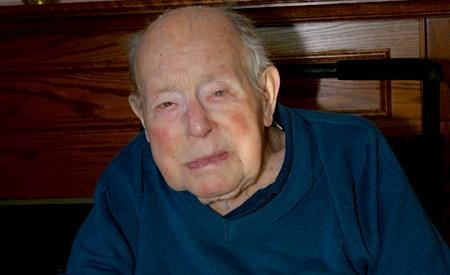Some history buffs may recall that the first Roman invasion of Britain occurred when Julius Caesar ascended its south-eastern slopes in 55 BC to face a hoard of blue-faced warriors defending their territory.
However, fewer would know that this event was re-staged on the southern slopes of Savary Island in 1956 under the direction of Ken Bradley, the brilliant and imaginative teacher who taught at JP Dallos Middle School from the late 1940s to 1970. For many, Bradley was the best teacher they ever had, Powell River’s own “Mr. Chips.” He passed away in Victoria on July 28 after 107 well-lived years.
Bradley was born in Dudley, England, in 1905 and emigrated to Canada with his parents seven years later. They settled in Duncan, BC, and following the drowning death of his father shortly after, he was raised by his strict Victorian mother who could foresee that Bradley’s salvation would be based on a classic education. Bradley excelled, graduating top of his class in all subjects including Latin and Greek which he took by correspondence.
After a year of reporting for the local paper, the editor called him in and told him he was a “lousy reporter,” (Bradley was scrupulously accurate and dispassionate in his reporting of news), but the editor added he would make a great teacher. Little did the editor realize that eventually this review of Bradley’s performance would have such a positive effect on the lives of thousands of his students.
With the help of a great uncle in England, Bradley was able to attend the one-year teachers’ program at the Normal School in Victoria. His first teaching assignment was in a farmhouse in the northern reaches of the province, eight miles’ walk from the railway tracks near Reid Lake. Subsequent assignments in Monte Creek—where he met his wife Anne—and Grand Forks preceded his arrival in Powell River in 1948. They built their modest home on what is now Gordon Avenue where Bradley meticulously planted a fantasy garden consisting of Ming trees, rare cacti and perhaps Powell River’s first surviving palm tree.
Bradley wanted his students to enjoy what they were being taught, to find the subject matter interesting and exciting, and taught in such a way they would never forget what they learned. He succeeded on all counts and this can be confirmed by asking any of his former students. His approach was unique.
He was able—at the concern of successive school superintendents—to transform the tedious and official curriculum into an exciting array of stories, demonstrations and student participation. He would supplement his enthusiastic classroom lectures with outside experiences such as taking science students for fossil digs near Drumheller, Alberta, leading his students late in the evening up onto the roof of the school so they could view—through his home-made telescope—four of Jupiter’s moons and turning local beaches from an array of rocks and sand to a treasure-trove of granite, feldspar, quartz, conglomerate and limestone.
In the classroom, nearing the end of the year, he would have his students take turns to act out important historical events. The rest of the class would try to guess what event was being comically depicted. Bradley didn’t mind at all if his students were actually enjoying themselves. To that end he further annoyed officialdom by reading and dramatizing a book not on the official curriculum, one that would engage the students and for some students get them to read on their own for the first time. (Sir Arthur Conan Doyle’s Lost World comes to mind.)
Knowing Powell River was a pulp and paper town, he obtained papermaking equipment, installing it in the rear cloakroom and giving each student a chance to make their own paper. Bradley was also a railway historian and published a book on the many logging railways in the region, on local geological origins of the surrounding area and some of Powell River’s local history. His keenness for railways also had a practical side. With the help of his neighbour he built his own railway extending from the high tide line 80 feet or so out into the water to transport his boat via a dolly resting on the rails.
Bradley’s musical accomplishments were well known in the 1950s when he organized, directed and conducted yearly Gilbert and Sullivan operettas, including the Mikado, Trial by Jury and Pirates of Penzance, all performed to enthusiastic audiences at Dwight Hall. He also organized Powell River Credit Union girls’ choir and did the near impossible by organizing an all-boys’ grade six choir from a group that had never sung a note.
Bradley spent his retirement in Victoria and his later years in Mount St. Mary’s Hospital. He never had an idle day in his life. He was forever reading, researching, pondering the questions of the universe. In his last year he returned to his favourite and most respected age in history: Ancient Greece. He focused on the ancient philosophers and the Greek language and was often seen with an enormous Greek dictionary resting on his lap. There wasn’t a day that Bradley lived when he didn’t learn something and as his frequent visitors can confirm, there was never a day when he didn’t share his ideas and thoughts with someone.
As one of BC’s senior educators, a former student said of Bradley, “There are many good teachers, but Ken was truly ‘transformational.’”
For those of us lucky enough to have had Bradley for a teacher, how true that is.
Dick Gold now resides in Cobble Hill and visited Ken Bradley regularly until his death.



